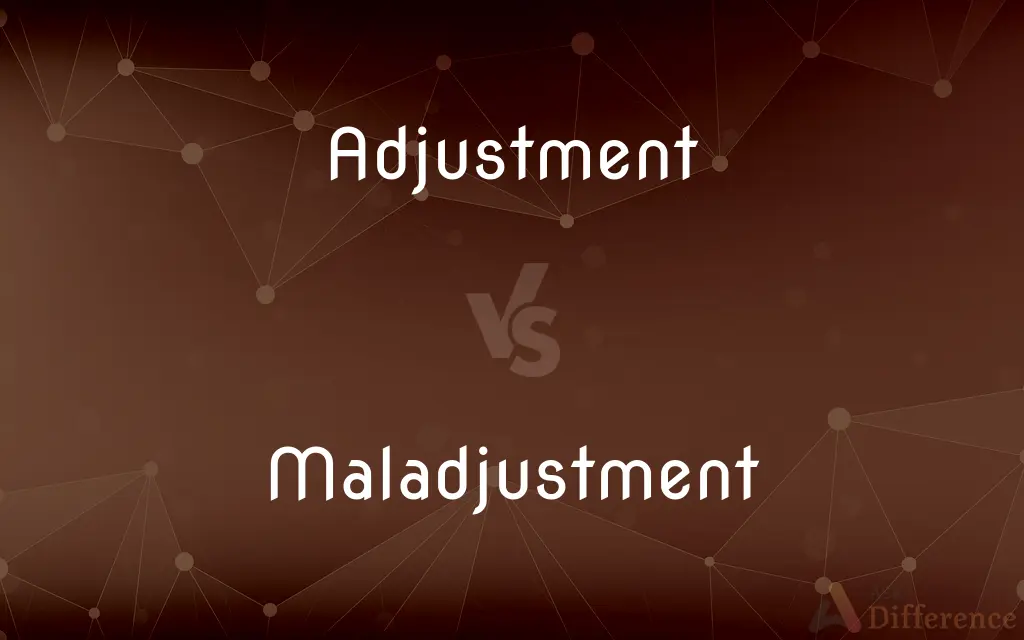Adjustment vs. Maladjustment — What's the Difference?
By Tayyaba Rehman — Updated on September 25, 2023
Adjustment refers to the process of adapting or altering to fit new conditions, while maladjustment implies failure to adapt suitably, often leading to psychological imbalance or social dysfunction.

Difference Between Adjustment and Maladjustment
Table of Contents
ADVERTISEMENT
Key Differences
Adjustment and Maladjustment are opposites in terms of their implications and outcomes. Adjustment refers to the processes or actions taken to achieve harmony, balance, or conformity with one’s environment, either by changing oneself or one’s surroundings. It reflects a positive and proactive approach to managing and adapting to new or altered conditions, exemplifying flexibility and adaptability. It is a critical component in navigating through changes and challenges efficiently and effectively.
Maladjustment, on the contrary, refers to the inability to adapt appropriately to the demands or stresses of the environment, leading to psychological imbalance or social dysfunction. It implies a lack of congruence with the environment due to inadequate or inappropriate adaptive responses. Maladjustment often results in behavioral problems, emotional distress, and impaired functioning, reflecting a state of disharmony and imbalance.
Adjustment represents a state of equilibrium and compatibility with one’s environment and is essential for maintaining mental and emotional well-being. When individuals adjust well, they are better able to cope with the challenges and stresses of life, which contributes to improved overall functionality and well-being. They are more likely to exhibit resilience, effective problem-solving skills, and a positive outlook.
Conversely, maladjustment is indicative of conflicts, struggles, and incompatibility with the environment and can have severe repercussions on an individual's mental health and social interactions. Maladjusted individuals may experience difficulties in forming healthy relationships, maintaining emotional stability, and exhibiting appropriate social behavior, often leading to isolation, frustration, and dissatisfaction.
In essence, while adjustment signifies successful adaptation and harmonious existence within one’s environment, promoting well-being and effective functioning, maladjustment denotes unsuccessful adaptation leading to disharmony, distress, and impaired social and psychological functioning.
ADVERTISEMENT
Comparison Chart
Definition
The process of adapting or altering to fit new conditions.
Failure to adapt suitably to the environment, leading to psychological imbalance or social dysfunction.
Implication
Positive, indicative of flexibility and adaptability.
Negative, indicative of conflicts and struggles.
Outcome
Harmony, balance, or conformity with the environment.
Disharmony, distress, and impaired functioning.
Psychological Aspect
Promotes mental and emotional well-being.
Leads to behavioral problems and emotional distress.
Behavioral Aspect
Reflects effective coping and problem-solving skills.
Exhibits inappropriate adaptive responses and impaired social interactions.
Compare with Definitions
Adjustment
A change made to reconcile discrepancies.
The accountant made an adjustment to the financial statements to reflect the actual income.
Maladjustment
The state of being unable to adapt properly to the environment.
His constant rebellious behavior is a sign of maladjustment to societal norms.
Adjustment
The process of altering or adapting to create fit or agreement.
The new employee made a quick adjustment to the company's work environment.
Maladjustment
An indication of impaired functioning and disharmony with the environment.
Maladjustment can lead to severe emotional distress and social isolation.
Adjustment
The act of achieving harmony or balance with one’s environment.
His adjustment to the new city was facilitated by his friendly neighbors.
Maladjustment
Reflects struggles, conflicts, and incompatibility with societal expectations.
His maladjustment to the workplace environment caused frequent disruptions and dissatisfaction.
Adjustment
A correction or alteration to improve compatibility.
The team made an adjustment to the project plan to accommodate the client's needs.
Maladjustment
A condition marked by psychological imbalance due to inadequate adaptation.
The child's maladjustment at school resulted in frequent conflicts with peers.
Adjustment
Modification designed to achieve desired output or functionality.
A slight adjustment to the machine's settings improved its performance significantly.
Maladjustment
Inability to cope with the demands or stresses of the surroundings.
Chronic maladjustment often results in behavioral problems and relationship difficulties.
Adjustment
The act of adjusting or the state of being adjusted.
Maladjustment
Inability to adjust to the demands of interpersonal relationships and the stresses of daily living.
Adjustment
A means of adjusting.
Maladjustment
The condition of being unable to adapt properly to your environment with resulting emotional instability
Adjustment
Settlement of a debt or claim.
Maladjustment
Maladjustment is a term used in psychology to refer the "inability to react successfully and satisfactorily to the demand of one's environment". The term maladjustment can be refer to a wide range of social, biological and psychological conditions.Maladjustment can be both intrinsic or extrinsic.
Adjustment
A modification, fluctuation, or correction
Made an adjustment on the telephone bill.
An adjustment in the consumer price index.
Maladjustment
Faulty or inadequate adjustment, as in a machine.
Adjustment
The action of adjusting something
Maladjustment
A poor or faulty adjustment, especially of a mechanism.
Adjustment
The result of adjusting something; a small change; a minor correction; a modification or alteration
Maladjustment
(psychology) The inability to adapt oneself to the needs of others, or to the stresses of normal life.
Adjustment
The settling or balancing of a financial account
The credit card company made an adjustment to my account to waive the late fee.
Maladjustment
A bad adjustment.
Adjustment
The behavioural process of balancing conflicting needs, or needs against obstacles in the environment.
When Jim graduated, he found adjustment to the working world difficult.
Adjustment
The assessment, by an insurance company, of a claim; the settlement of such a claim
Adjustment
The act of adjusting, or condition of being adjusted; act of bringing into proper relations; regulation.
Success depends on the nicest and minutest adjustment of the parts concerned.
Adjustment
Settlement of claims; an equitable arrangement of conflicting claims, as in set-off, contribution, exoneration, subrogation, and marshaling.
Adjustment
The operation of bringing all the parts of an instrument, as a microscope or telescope, into their proper relative position for use; the condition of being thus adjusted; as, to get a good adjustment; to be in or out of adjustment.
Adjustment
Making or becoming suitable; adjusting to circumstances
Adjustment
The act of making something different (as e.g. the size of a garment)
Adjustment
The act of adjusting something to match a standard
Adjustment
The process of adapting to something (such as environmental conditions)
Adjustment
An amount added or deducted on the basis of qualifying circumstances;
An allowance for profit
Common Curiosities
Can adjustment improve overall well-being?
Absolutely, successful adjustment promotes mental and emotional well-being by facilitating effective coping, problem-solving, and positive interactions with the environment.
Does maladjustment lead to psychological problems?
Yes, maladjustment often leads to psychological imbalance, emotional distress, and behavioral problems due to failure to adapt suitably to the environment.
Can adjustment involve modifications to the environment?
Yes, adjustment can involve making alterations or modifications to one’s environment to enhance compatibility and achieve a harmonious fit.
Is adjustment a proactive or reactive process?
Adjustment can be both proactive, as in preparing or modifying in anticipation of change, and reactive, as in adapting in response to encountered changes or challenges.
Does maladjustment reflect failure to cope with environmental demands?
Yes, maladjustment reflects a failure to cope adequately with the demands or stresses of the environment, leading to disharmony and dysfunction.
Is adjustment indicative of adaptability?
Yes, adjustment is indicative of adaptability and reflects one's ability to alter or modify oneself or one’s environment to achieve harmony and balance.
Can maladjustment impact social relationships?
Yes, maladjustment can severely impact social relationships due to impaired social interactions, conflicts, and struggles stemming from inadequate adaptation.
Share Your Discovery

Previous Comparison
Incentive vs. Drive
Next Comparison
Cargo vs. PayloadAuthor Spotlight
Written by
Tayyaba RehmanTayyaba Rehman is a distinguished writer, currently serving as a primary contributor to askdifference.com. As a researcher in semantics and etymology, Tayyaba's passion for the complexity of languages and their distinctions has found a perfect home on the platform. Tayyaba delves into the intricacies of language, distinguishing between commonly confused words and phrases, thereby providing clarity for readers worldwide.
















































